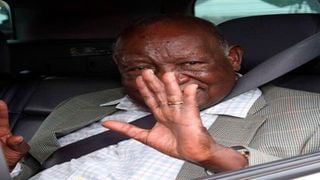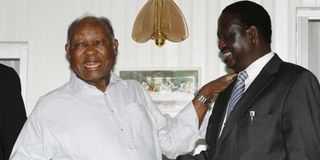
Veteran politician Kenneth Matiba waves at a crowd on May 19, 2016. Matiba was an agitator for multiparty democracy and a leading figure against then President Moi.
| File | Nation Media GroupWeekly Review
Premium
Revealed: How UK plotted to stop Kenneth Matiba arrest after 1990 London hospital stay
A trove of recently declassified documents in London reveal how British Prime Minister John Major took urgent steps to try and stop Kenneth Matiba from travelling to Nairobi in May 1992 following concerns about the opposition leader’s safety.
Matiba, who was a prominent agitator for multiparty democracy and a leading figure against President Daniel arap Moi’s authoritarian rule, had been receiving treatment in London following a stroke he had suffered while at Kamiti Maximum Prison.
He had been arrested by the Moi regime outside his office in Nairobi on July 4, 1990 and detained under Public Security Regulations that gave the government powers to detain an individual indefinitely without charge or trial. It was just three days to the banned Kamukunji opposition rally and there was anxiety within the government about the possibility of Matiba and other activists defying the ban.
The opposition leader was put in solitary confinement, with no access to his personal doctor despite his existing medical condition. In June 1991, following pressure from diplomats, activists and his own family about his deteriorating health, Matiba was transferred to Nairobi Hospital and later released from detention on what the government described as medical grounds.
On July 7, 1991 just a day after being discharged from Nairobi Hospital, he flew to London on the recommendation of his personal doctor to seek better treatment. Even though he stayed in London for almost a year he still struggled with post-stroke trauma, including an inability to read or write, the documents reveal.
A private flat had to be rented for him in Central London to enable him recuperate as he prepared to return to Kenya.
In May 1992, as Matiba prepared to return to Kenya after eleven months in London, information reached British Prime Minister John Major that Matiba, who had not yet recovered fully, was likely to be arrested as soon as he arrived in Nairobi, according to declassified documents seen in London by the Weekly Review.
Consequently, the prime minister sent two officials from the Foreign Office to warn Matiba—who was already at London’s Heathrow Airport—not to travel unless he had the Kenya government’s assurances that he wouldn’t be detained.
Unfortunately, by the time the messengers were arriving at Heathrow, Kenya Airways flight KQ 113, in which Matiba was a passenger, had just taken off.
“The prime minister has instructed that Matiba be warned of the risk of arrest on his return to Nairobi and advised not to go. We tried to get this message to him here but the plane KQ 113 ETA Nairobi has just left,” read a telegram marked secret and dated May 1992, sent to Nairobi
Without any other way of stopping Matiba from travelling, the British prime minister instructed the Foreign Office that a message be sent to President Moi that in case he had any plans of arresting Matiba, then he would want to speak to the Kenyan Head of State directly to demand an explanation.
Major also suggested that a representative from the British High Commission in Nairobi be at the airport to speak to Matiba immediately after his arrival.
Also Read: Use-and-dump culture has stunted democracy
Acting on Major’s directive, an official from the Foreign Office contacted the High Commission in Nairobi advising that in the absence of the High Commissioner, the most suitable representative should take appropriate action to phone State House Nairobi and also meet Matiba at Jomo Kenyatta International Airport. According to the documents, the official went on to advise the High Commission that “in speaking to Matiba and the Kenyan government, you will need of course to say no more than we have heard of a rumour of action against Matiba on arrival”.
On Saturday May 2, 1992 at a quarter past midnight, the duty officer at the British High Commission in Nairobi called State House Nakuru and got hold of State House Comptroller Abraham Kiptanui. After apologising to Kiptanui for calling late, the diplomat expressed to him the British prime minister’s concerns about the possibility of Matiba being arrested, adding that “the prime minister would welcome an opportunity to discuss the matter personally with President Moi before any action were taken”.
According to a report filed by the Nairobi-based British diplomat after the phone call, Kiptanui expressed surprise about the information and denied that there were plans to arrest Matiba.
“Kiptanui said Matiba was an old friend of Kenya, who was now returning home. He was welcome, and there would be no moves to curtail his freedom of movement. He failed to understand how the rumour had started,” the official telegrammed London.

ODM leader Raila Odinga (right) and the late veteran politician Kenneth Matiba at his Riara home in 2010.
Also Read: How Matiba lost his Sh5bn empire
That same day in the morning, Matiba arrived at Jomo Kenyatta International Airport and was received by an enthusiastic crowd. Also at the airport to receive him was the British High Commission diplomat who had contacted State House. He spoke briefly to Matiba after he came out of the plane, warning him that there was a perceived risk of him being arrested even though State House had denied it.
“Matiba, who appeared tired and frail, was grateful for this interest, but he shrugged and said that if he were detained, then so be it,” the British official informed London, according to the recently released documents.
Apart from the British prime minister’s concerns, the documents also reveal how Matiba, while recuperating in a private flat in Central London, contacted British authorities to report about his wife’s encounter with a group of people who looked suspicious.
According to the report made by Matiba, his wife was on her way to the shops in London when she met a group of men claiming to be Ugandans who asked her for directions to a local department store. Even though the men did not threaten her, Matiba and his wife suspected that the men were employed by the Kenyan security services. Although the British did not consider the matter a serious threat, they were not ready to take chances. An officer from the Foreign Office instructed the police to contact the Matibas immediately.
“I have subsequently told Chief Inspector Catherall that while I doubt whether there is anything in their fears about this particular incident, it would be reassuring if the police could check on the security situation in their flat and keep an eye on them,” the official wrote in a document dated March 25, 1992, marked “restricted.”
The official also revealed details of his private meeting with Matiba in his flat in London.
“At his request, I called on Kenneth Matiba on 23 March. His invitation had no doubt been extended as a result of my remark to Gitobu Imanyara that we found Matiba elusive,” he wrote.
During the meeting, Matiba expressed fear that Moi would willingly murder him, pointing out that a group of men who had bumped into his wife were possibly on that mission. He revealed that there were three attempts on his life while he was still in Kenya, including an attempted car bombing and an attempted poisoning while he was in prison.
“His wife, who was present throughout, told me about the occasion when Kenyan security agents, looking for Matiba, had entered her home and failing to find him, had attacked her with an axe and fractured her skull,” the official reported .
Following his return to Kenya, Matiba joined the push for a united front to remove Moi’s ruling party Kanu from power. However, competing ambitions resulted in a split of the opposition behemoth Ford, which was to serve as the vehicle to achieve the objective. Matiba’s faction called itself Ford Asili while Jaramogi Oginga Odinga’s was referred to as Ford Kenya.
In the event, Moi ended up winning the 1992 multiparty election, with Matiba becoming the leader of the opposition until 1997. He died in 2018 after years of battling illnesses linked to his detention and mistreatment by the Moi regime .
- Opiyo is a London-based Kenyan journalist and researcher.





